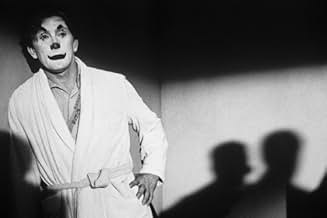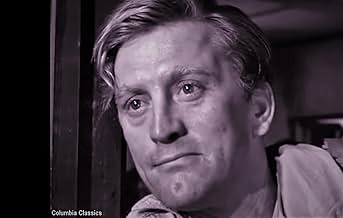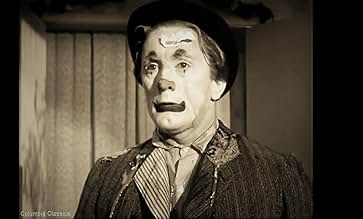Füge eine Handlung in deiner Sprache hinzuIn 1949, former concentration camp inmate and Berlin native Hans Muller, immigrates to Israel where, due to psychological problems, he can't adjust to peacetime life.In 1949, former concentration camp inmate and Berlin native Hans Muller, immigrates to Israel where, due to psychological problems, he can't adjust to peacetime life.In 1949, former concentration camp inmate and Berlin native Hans Muller, immigrates to Israel where, due to psychological problems, he can't adjust to peacetime life.
- Auszeichnungen
- 1 wins total
- Yehoshua Bresler
- (as Joey Walsh)
- Willy Schmidt
- (as Oscar Karlweis)
- Mukhtar
- (Gelöschte Szenen)
- Hannah
- (Nicht genannt)
- Refugee
- (Nicht genannt)
- Papa Sander - Susy's Father
- (Nicht genannt)
- Bus Driver
- (Nicht genannt)
- Telephone Girl
- (Nicht genannt)
- Audience Member
- (Nicht genannt)
- Mordecai
- (Nicht genannt)
Empfohlene Bewertungen
Unfortunately, Kramer had a habit of assigning George Antheil to score his films. Antheil contributes another inappropriate score heavily accenting any melodramatic moment that points up Kirk's anguish, much the way he did in Kramer's NOT AS A STRANGER. It didn't work there and it doesn't work here, especially during the "escape" scene where the music reaches a frenzied fever pitch of discordant notes.
It's hard to fully sympathize with Douglas' tormented character and that is the film's chief handicap. As the man tracking down the fugitive, PAUL STEWART does his usual workmanlike job. Trouble is, there's an almost documentary feel to the story and its pivotal character is never fully fleshed out, remaining somewhat of an enigma despite Douglas' good performance. When romance comes into the story with the entrance of MILLY VITALE, Douglas' character softens a little under her compassionate care.
Some vivid glimpses of Israel, circa 1949, and good location photography gives the story an authentic air, but the story values are never more than ordinary and the total effect is bland.
Worthwhile mainly for Kirk Douglas fans, it fails to make the impact intended as a serious study of a man haunted by prison camp memories.
Back in the day Douglas was a music hall entertainer, a juggler by trade, and from what I could see Douglas mastered the art himself to make his performance quite believable. As an actor I have never seen anyone better than Kirk Douglas to go from 0 to 120 in emotions in a matter of seconds. Kirk needed that ability to play the psychologically tattered Hans Muller.
A lot of folks who survived questioned the very nature of nature's God to have allowed such a thing to happen. Even more so they questioned the randomness of those who did survive. Douglas lost his wife and children there.
When he wanders away from the settlement camp in Haifa and is questioned by an Israeli policeman, the demons from Europe return and Douglas strikes at the cop. Thinking he's killed him Kirk goes on the run and he teams up with another camp survivor, an orphan played by Joey Walsh.
Their wanderings and eventually settling down in a kibbutz is most of the film. The Juggler was the first American production to be shot in Israel and we see Douglas and Walsh in the real Haifa, the real Nazareth and in the countryside of Israel which had seen its own war for survival at birth the year before.
The Juggler however does stick to the story and it doesn't just become an Israel travelogue. And it's a nice story about a good man who's seen the worst of what his fellow human beings can do just trying to find a place in a promising, but strange new world.
In the opening sequence, a group of Jewish refugees are being bussed to their new living encampments in the new state of Israel. The children on the bus are understandably frightened; they're asked questions by uniformed officers who claim they're classifying them for their safety-and this time, they're supposed to believe everything's going to be alright. Kirk calms down a little girl by drawing a face on his hand and distracting her with humor, but he's also frightened. Immediately after the audience is lulled into a sense of security, he approaches a woman with her children who he believes is his long-lost family. He cries and begs her to remember him until his friend whispers in his ear, "Your family is dead, Hans. You've seen the certificate." It's an incredible scene, not only because of Kirk's heart-wrenching performance, but because it shows the audience the post-war emotionality of survivors. How can they possibly relax and trust when they've lived through such horrors and are missing their family and friends?
My one comment on this movie is the uneven storyline. The beginning follows Kirk's introduction to his new home, but when he runs away after a violent run-in with a policeman, he takes up with a young boy, Joey Walsh. He and Joey hike the countryside, often acting as though they haven't a care in the world. Kirk even meets up with the beautiful Milly Vitale and strikes up a romance, but this lighter side is far from the true point of the story. Perhaps the filmmakers felt audiences couldn't handle another hour as heavy as the first twenty minutes, which I understand.
Chances are you've never heard of this movie. I hadn't, and I've seen dozens of Kirk Douglas movies. If you can find a copy, you'll get to see an incredible performance in a groundbreaking drama. It might not be one you'll want to watch over and over again, because it is upsetting, but you'll be very glad you found it. Start looking. You owe it to Kirk Douglas to see this movie.
Wusstest du schon
- WissenswertesThe film is based on author Michael Blankfort's novel with the same title. Initially, producer Stanley Kramer wanted author Blankfort to direct the film but Blankfort was refused a passport for travel to Israel by the United States State Department because Blankfort had been a Communist many years earlier. Kramer reassigned the film to director Edward Dmytryk who served almost a year in prison in 1948 after being convicted of contempt of Congress for refusing to divulge his political affiliations. After his release from prison, Dmytryk moved to England but returned to the U.S. and gave testimony before the House Committee on Un-American Activities and, as a result, was removed from the film industry blacklist.
- Zitate
Registration Official at Haifa: Name?
Hans Muller: [softly] Hans Muller
Registration Official at Haifa: You have to speak louder
Hans Muller: HANS MULLER's my name
Registration Official at Haifa: A little softer please. Place of birth?
Hans Muller: Germany... Munich... Beautiful city
Registration Official at Haifa: Occupation before the war?
Hans Muller: You wouldn't believe me
Registration Official at Haifa: I'll believe anything
Hans Muller: I was a juggler.
Registration Official at Haifa: What?
Hans Muller: A juggler
[pantomimes juggling balls in the air]
Registration Official at Haifa: We need a juggler like a hole in the head. What can you do besides throwing things up in the air and catching them?
Hans Muller: My dear sir, to say I throw things up in the air and catch them is like saying Shakespeare just wrote words. Would you care to see my scrapbook?
Registration Official at Haifa: No. Show it when you look for a job... if there are any for jugglers
Hans Muller: I'm retired. I havent thrown up anything but bad food in ten years
Registration Official at Haifa: So what else can you do?
Hans Muller: I can wash dishes, sweep barracks, clean toilets. I can also smile while being beaten by fists, feet, straps and long rubber hoses. I can be used as a guinea pig for new drugs and old poisons. All of which we learned as guests of the Nazis.
- VerbindungenFeatured in Dick Cavett Show: Kirk Douglas (1971)
Top-Auswahl
- How long is The Juggler?Powered by Alexa
Details
- Laufzeit1 Stunde 24 Minuten
- Farbe
- Seitenverhältnis
- 1.37 : 1
Zu dieser Seite beitragen




































